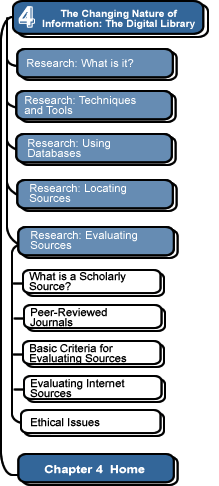

Evaluating Internet Sources
Any Web site, or any information it may contain, can be used for a research project. The trick is to use websites appropriately. All undergraduate research projects need scholarly and peer-reviewed sources to substantiate the author's arguments. These sources can be found using the "Research Databases" link found on the Hekman Digital Library website. But sources that carry less scholarly weight, sites that may be biased, fluffy, or even rife with errors, can be important components in building a research project. At the bottom of this page are some examples of websites and their possible uses.
Primary
Source Material (Example)
The Web is often the best place for finding primary source material.
Primary source material is anything written at the time the event occurred.
For example, Huckleberry Finn, a diary, a sermon, a scientific
experiment, or a newspaper article all qualify as primary documents. It
is essential that you verify that the content has not been modified.
Evaluation Criteria: Modified
Documents
from an Official Website (Example)
Documents can be taken from the official website of a respectable and responsible
organization. Websites for government agencies, corporations, and organizations
for the public good (e.g., the American Cancer Society) would be considered
official websites. These organizations have a reputation to uphold and
will usually evaluate all material posted on their websites. However,
the material may reflect only one side of the issue.
Evaluation Criteria: Official Website; Author/Authority; Audience; Objectivity; Currency; Modified
Overview
(Example)
These Web sources are useful for understanding the topic and are analogous
to encyclopedia articles. Use information you find in these sources with
caution, because the accuracy of the information they contain is frequently
unverified. Overview sources can lead to additional clues about people,
places, and things associated with the topic, but they should not be considered
scholarly or essential to the development of an argument.
Evaluation Criteria: Objectivity; Currency; Author/Authority
Factual/Statistical
Information (Example)
The Web is a great place to locate factual and statistical information.
Does the webpage cite the source of the information? If it does, and
if it is possible to obtain the source, use it instead of the website.
If the Web source is an exact copy of the printed source—a pdf file,
for example—then verifying the information is not necessary.
Evaulation Criteria: Modified; Currency; Author/Authority
Anecdotal
/ color (Example
- Humorous look at plagiarism)
These resources are used to spice up a paper with a few insignificant but interesting
facts
Evaluation Criteria: Coverage
Arguments Made by the "Other Side" (Example)
What are proponents of the "other side of the coin" saying? Often, the views of the "other side" are not well represented in scholarly literature. Examples include the anti-anti-smoking position, the Holocaust revisionist position, etc. To properly understand your position, you may need to incorporate arguments from the other side. Make sure the spokesperson (website) you select is reasonable.
Evauation Criteria: Author/Authority; Objectivity; Coverage
While there may be more categories, let's look at webpages that fall into the four mentioned:
![]()
![]()
These pages were
written by Glenn Remelts.
and edited by Jeffrey L. Nyhoff and Nancy Zylstra
©2005 Calvin University (formerly Calvin College), All Rights Reserved
If you encounter technical errors, contact computing@calvin.edu.